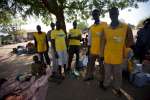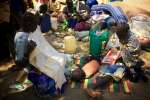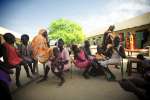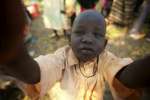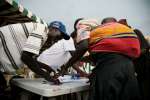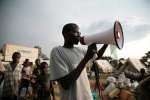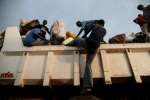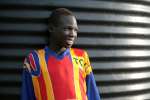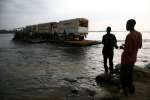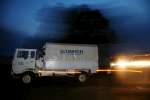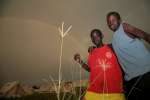Guor Marial: the refugee marathon man running for the world
News Stories, 14 August 2012
LONDON, 14 August (UNHCR) – Guor Marial has been running since he was eight years old, but nearly two decades after he had to run from armed militiamen in South Sudan, this refugee is now a world-class athlete competing in the Olympic marathon.
"The last time I saw my family was in 1993 – almost 20 years ago," Marial told UNHCR as he awaited the Marathon that was run on the last day of the London Olympics. "I hope they will be able to watch me run on TV, they will walk to the nearest city Panrieng, which is 30 miles (50 km) away."
Marial, 28 and now living in the United States, became separated from his family in what was then a single country of Sudan torn by civil war. His village was burned down, 28 members of his family were killed and his jaw was smashed by a rifle butt.
Trying to escape, he was captured and used as forced labour. He eventually got away and found relatives further north in Sudan, where he remained until he left for Egypt at the age of 16. He was accepted for resettlement in the United States, where he still has refugee status.
"Running is something I started doing to make friends in high school and to be part of a team," Marial said. His potential was spotted and he was given a scholarship to Iowa State University, where in 2009 he received his degree in chemistry.
"After graduating from college, it (running) was something I wanted to do as a career and to show my appreciation for those who supported me.," Marial said. Although he had run only two marathons ever, he qualified to be among the 105 runners who competed in the gruelling test last Sunday.
He was one of a handful of athletes at the London Olympics competing under the flag of the International Olympic Committee. He had one draped on the wall of the room he was allocated during the games. He finished in 47th place, covering the 42.19 km in 2 hours and 19 minutes.
"I want to thank the International Olympic Committee for giving me the opportunity to be here and raise awareness about refugees and all the people around the world who don't have a country. To run under the Olympic flag – I feel like I'm representing the whole world."
In the Olympic village Marial mixed with the international sports stars he had seen before only in the media, gaining new confidence and motivation to accomplish even more.
He hopes his story will inspire members of the next generation in South Sudan, the new country that emerged from the civil war, to strive to reach the Olympics. It has been a remarkable journey from smouldering village to running through the streets of London under the television cameras.
"In the refugee camps it's hard, you're isolated. You only think about what there is to eat… That kind of toughness, being able to survive those critical conditions, had an impact on my daily life and how I face things," Marial said.
"When I left South Sudan for Cairo, and then the United States, my world kept getting bigger and bigger and I learnt that there was another way, that people could live peacefully. "I wasn't interested in running in the camp because running there is running away from danger. But now I want to run every day."
By Laura Padoan in London
















